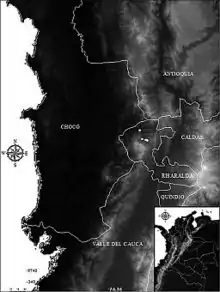Hemibrycon sanjuanensis
Hemibrycon sanjuanensis is a species of characin from the upper San Juan River, Colombia.[1]
| Hemibrycon sanjuanensis | |
|---|---|
 | |
| Scientific classification | |
| Domain: | Eukaryota |
| Kingdom: | Animalia |
| Phylum: | Chordata |
| Class: | Actinopterygii |
| Order: | Characiformes |
| Family: | Characidae |
| Genus: | Hemibrycon |
| Species: | H. sanjuanensis |
| Binomial name | |
| Hemibrycon sanjuanensis Román-Valencia, Ruiz-Calderón, Taphorn & García-Alzate, 2014 | |
 | |
| Range of H. sanjuanensis | |
Etymology
It takes its name from the San Juan River, where specimens were collected.[1]
Description
Individuals range between 21.3–84.9 millimetres (0.84–3.34 in) in length. The body is slender and long, with a short, compressed face and flexible lips. In an example of sexual dimorphism, the rays of males' pelvic and anal fins are lined with small hooks.[1]
General coloration is a dark brownish-yellow, with a dark stripe running from directly behind the gills to the caudal peduncle. The ventral surface is light yellow. The dorsum and fins are patterned with melanophores. A reddish spot can be observed on the ventral part of the base of the caudal fin.[1]
Range and habitat
H. sanjuanensis is believed to be endemic to the upper San Juan River in Colombia. Specimens were recovered from clear, fast-flowing streams with sandy or rocky bottoms.[1]
Diet
The species is insectivorous. Among other things, it has been known to eat water scavenger beetles, black flies, flesh flies, damselflies, predaceous diving beetles, caddisflies, nematodes, and isopods.[1]
References
- Román-Valencia, C.; Ruiz-Calderón, R.I.; Taphorn, D.C.; García-Alzate, C.A. (2014). "A new species of Hemibrycon (Characiformes, Characidae) from the upper San Juan River drainage, Pacific versant, Colombia". ZooKeys (454): 109–125. doi:10.3897/zookeys.454.6954. PMC 4258741. PMID 25493068.